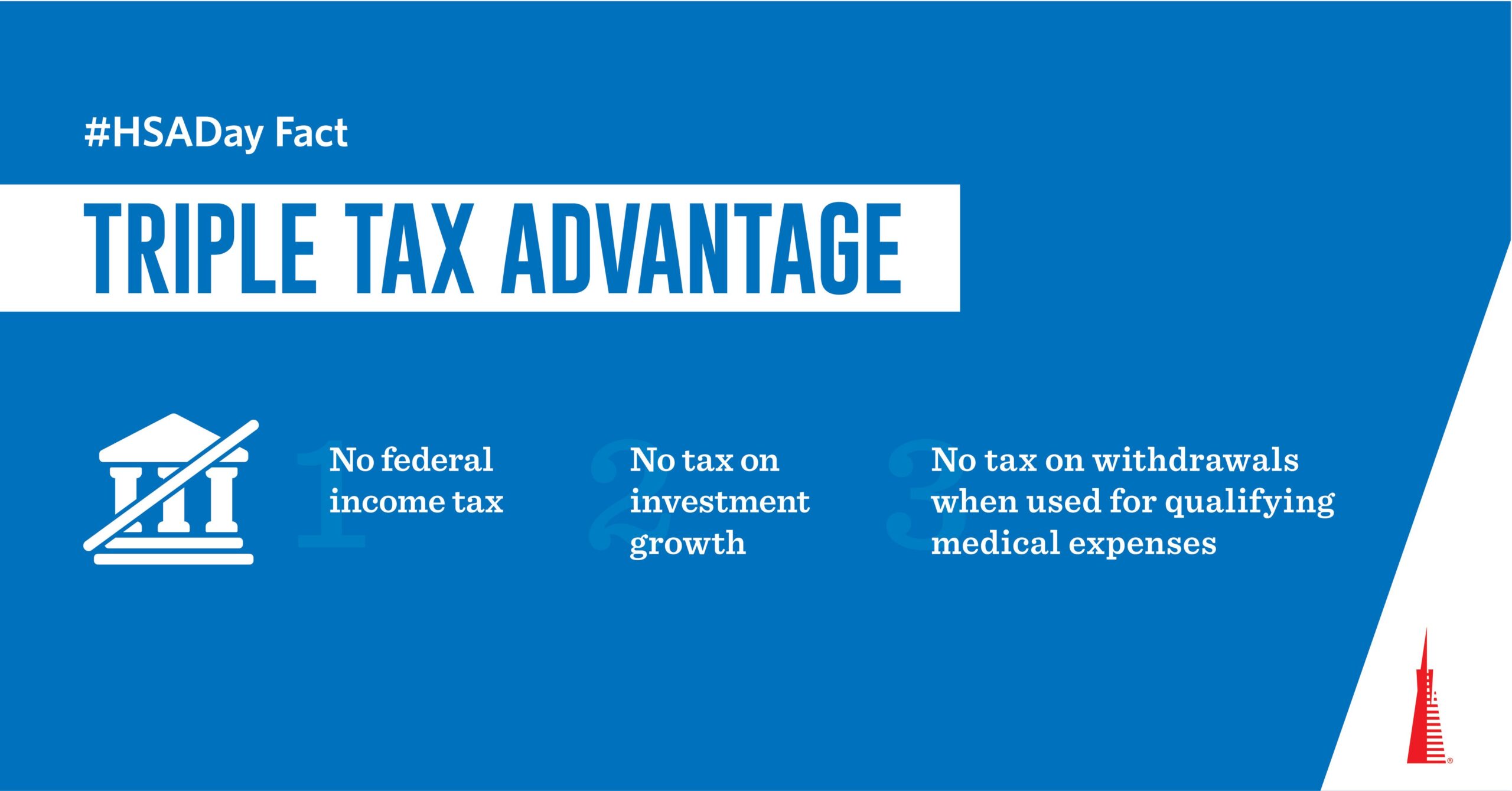GAMBRELL FINANCIAL NEWS

HSA’s Are Triple Tax-Advantaged Accounts!
Money is contributed to the account tax-free, any interest earned on the money is tax-free and distributions made on eligible expenses are tax-free as well.
Only 4% of all HSA participants invest the monies inside of their accounts
TOP-RATED FINANCIAL NEWS

Don’t have time to read, you can listen to our podcast at: https://www.redzonetoolbox.com/
Have a topic you would like more clarity on send us an email: info@gambrellfinancial.com
HSAs Are Triple Tax-Advantaged Accounts!
HSAs Are Triple Tax-Advantaged Accounts!
Money is contributed to the account tax-free, any interest earned on the money is tax-free and distributions made on eligible expenses are tax-free as well.
But only 4% of all HSA participants invest the monies inside of their accounts, after 12 years of owning an HSA only 20% of participants are investing monies inside of their accounts. I have to assume; the vast majority simply don’t understand how these accounts work unaware of the investment options inside of their HSA accounts.
The one little secret that really blows it out the water with an H.S.A. is this:
Instead of claiming your deductions in the year in which they occur, let’s hold off a while. Let’s delay claiming those reimbursements until age 65 when you retire.
In the meantime, make sure you track your HSA eligible expenses… WHY?
The IRS doesn’t impose an expiration date on HSA reimbursements! You can receive a reimbursement from 20 to 30 years ago providing you have documentation for your eligible medical expenses and of course providing you own an HSA> for the years you are claiming reimbursement.
You can track your eligible expenses for 20 year or longer it doesn’t matter.
Let’s say you contribute $5,000 each year for 25 years starting at age 40, with a total contribution of $125,517 by age 65!
At 6% the total account value would be $285,174.
Let’s say over 25 years you spent $200,000 on eligible medical expenses.
At age 65 you can claim a $200,000 dollar income tax free lump sum reimbursement on these eligible medical expenses incurred over the last 25 years.
The money goes in tax free, the money grows tax free, and the money comes out tax free…
The Triple Tax Advantage!
NOW! We all know health care in retirement is expected to become very expensive. In this scenario after claiming a $200,000 lump sum reimbursement, you would still have $85,175 ready for you to use income tax free on eligible medical expenses during retirement.
And I must say, the list of eligible medical expenses is huge.
You can even get reimbursed for BC Powder, guys you can get reimbursed for condoms, the list of eligible medical expenses is huge. I’ll provide a link below with a list of 3,000 items you can seek reimbursement for.
The list of eligible medical expenses is so large, most people will easily exceed spending $200,000 by the time they reach retirement.
As an HSA owner you can choose to invest your savings so that they grow at the rate of the market or to keep it in a savings account earning interest. The money never expires and rolls over from year-to-year.
Anyone can contribute to an employee’s HSA. That includes the employees themselves, their employer, their friends, and their family, however the total of all contributions must not exceed the IRS’s annual contribution limit for that year. The HSA contribution limits for 2023 are $3,850 for self-only coverage and $7,750 for family coverage. Those 55 and older can contribute an additional $1,000 as a catch-up contribution.
HSA contribution guidelines in essence allow employers to double dip when contributing funds to an employee’s retirement accounts. An employer can match your contributions up to a set amount in your 401k accounts and contribute up to the current year’s maximum allowable amount in an HSA. How cool is that!
Start tracking and saving your receipts on over 3,000 plus items you spend money on everyday but didn’t realize you could seek reimbursement for.
Don’t claim these reimbursements today, delay until age 65 when you can claim a reimbursement on the growth of your account as well as the seed.
The IRS gives you an “Unlimited Amount of Time To Claim A Reimbursement” even if it’s 30 or 40 years later as long as you keep your documentation in order.
One final note, you don’t want to over contribute to an HSA, my office can you determine the optimal amount of money you should be contributing to your HSA.
Typically, we’ll plan for an amount of health care related expenses you might incur over 30 years or until age 65 while also factoring in an average growth rate of return.
The ideal scenario is to receive an income tax free lump sum reimbursement of at least $200,000 at age 65 while also maintaining a balance of tax-free money you can use for future medical expenses during retirement.
This potential $200,000 lump sum reimbursement at age 65 can allow you to delay early social security benefits. Each year you delay receiving social security benefits will add an extra 8% to your social security income till age 70!
A $200,000 lump sum income tax free reimbursement can help you bridge the gap allowing you to receive more income during retirement.
With a lump sum of $200,000 or more sitting in your account you can kick back and continue allowing your other accounts to grow while also having access to future tax free medical reimbursements during your retirement years.
Contact our office today for a comprehensive HSA strategy designed to help you win, in retirement!
my name is Mel Gambrell and For any questions comments or concerns please reach out to us by email to info@redzonetoolbox.com
HSAs For Small Business Owners
HSAs Are Triple Tax-Advantaged Accounts!
Money is contributed to the account tax-free, any interest earned on the money is tax-free and distributions made on eligible expenses are tax-free as well.
But only 4% of all HSA participants invest the monies inside of their accounts, after 12 years of owning an HSA only 20% of participants are investing monies inside of their accounts. I have to assume; the vast majority simply don’t understand how these accounts work unaware of the investment options inside of their HSA accounts.
The one little secret that really blows it out the water with an H.S.A. is this:
Instead of claiming your deductions in the year in which they occur, let’s hold off a while. Let’s delay claiming those reimbursements until age 65 when you retire.
In the meantime, make sure you track your HSA eligible expenses… WHY?
The IRS doesn’t impose an expiration date on HSA reimbursements! You can receive a reimbursement from 20 to 30 years ago providing you have documentation for your eligible medical expenses and of course providing you own an HSA> for the years you are claiming reimbursement.
You can track your eligible expenses for 20 year or longer it doesn’t matter.
Let’s say you contribute $5,000 each year for 25 years starting at age 40, with a total contribution of $125,517 by age 65!
At 6% the total account value would be $285,174.
Let’s say over 25 years you spent $200,000 on eligible medical expenses.
At age 65 you can claim a $200,000 dollar income tax free lump sum reimbursement on these eligible medical expenses incurred over the last 25 years.
The money goes in tax free, the money grows tax free, and the money comes out tax free…
The Triple Tax Advantage!
NOW! We all know health care in retirement is expected to become very expensive. In this scenario after claiming a $200,000 lump sum reimbursement, you would still have $85,175 ready for you to use income tax free on eligible medical expenses during retirement.
And I must say, the list of eligible medical expenses is huge.
You can even get reimbursed for BC Powder, guys you can get reimbursed for condoms, the list of eligible medical expenses is huge. I’ll provide a link below with a list of 3,000 items you can seek reimbursement for.
The list of eligible medical expenses is so large, most people will easily exceed spending $200,000 by the time they reach retirement.
As an HSA owner you can choose to invest your savings so that they grow at the rate of the market or to keep it in a savings account earning interest. The money never expires and rolls over from year-to-year.
Anyone can contribute to an employee’s HSA. That includes the employees themselves, their employer, their friends, and their family, however the total of all contributions must not exceed the IRS’s annual contribution limit for that year. The HSA contribution limits for 2023 are $3,850 for self-only coverage and $7,750 for family coverage. Those 55 and older can contribute an additional $1,000 as a catch-up contribution.
HSA contribution guidelines in essence allow employers to double dip when contributing funds to an employee’s retirement accounts. An employer can match your contributions up to a set amount in your 401k accounts and contribute up to the current year’s maximum allowable amount in an HSA. How cool is that!
Start tracking and saving your receipts on over 3,000 plus items you spend money on everyday but didn’t realize you could seek reimbursement for.
Don’t claim these reimbursements today, delay until age 65 when you can claim a reimbursement on the growth of your account as well as the seed.
The IRS gives you an “Unlimited Amount of Time To Claim A Reimbursement” even if it’s 30 or 40 years later as long as you keep your documentation in order.
One final note, you don’t want to over contribute to an HSA, my office can you determine the optimal amount of money you should be contributing to your HSA.
Typically, we’ll plan for an amount of health care related expenses you might incur over 30 years or until age 65 while also factoring in an average growth rate of return.
The ideal scenario is to receive an income tax free lump sum reimbursement of at least $200,000 at age 65 while also maintaining a balance of tax-free money you can use for future medical expenses during retirement.
This potential $200,000 lump sum reimbursement at age 65 can allow you to delay early social security benefits. Each year you delay receiving social security benefits will add an extra 8% to your social security income till age 70!
A $200,000 lump sum income tax free reimbursement can help you bridge the gap allowing you to receive more income during retirement.
With a lump sum of $200,000 or more sitting in your account you can kick back and continue allowing your other accounts to grow while also having access to future tax free medical reimbursements during your retirement years.
Contact our office today for a comprehensive HSA strategy designed to help you win, in retirement!
my name is Mel Gambrell and For any questions comments or concerns please reach out to us by email to info@redzonetoolbox.com
HSAs For Small Business Owners
For small buizz with
lets go home
